BBAL401 Company Law Assignment: Hall v Poolman Analysis
VerifiedAdded on 2023/01/19
|7
|1833
|81
Report
AI Summary
This report analyzes the case of Hall and Ors v Poolman and Ors [2007] NSWSC 1330, focusing on the issues of insolvent trading under the Corporations Act 2001. The case involved the directors of Reynolds Wine Group, Peter Poolman and Malcolm Irving, and their alleged responsibility for trading while insolvent. The liquidators pursued the directors for losses suffered by creditors. The report examines the relevant sections of the Corporations Act, including sections 588M, 588G, 536, and 1317, and the Conveyancing Act 1919, and the arguments presented by both sides. The court considered the liquidators' actions, the litigation funding agreement, and the potential benefits to creditors and the public. The report concludes that the directors were at fault for insolvent trading, but the court also examined the liquidator's actions. It highlights the importance of directors avoiding insolvent trading and the court's role in overseeing the process. The case underscores the complexities of corporate law and the responsibilities of company directors.
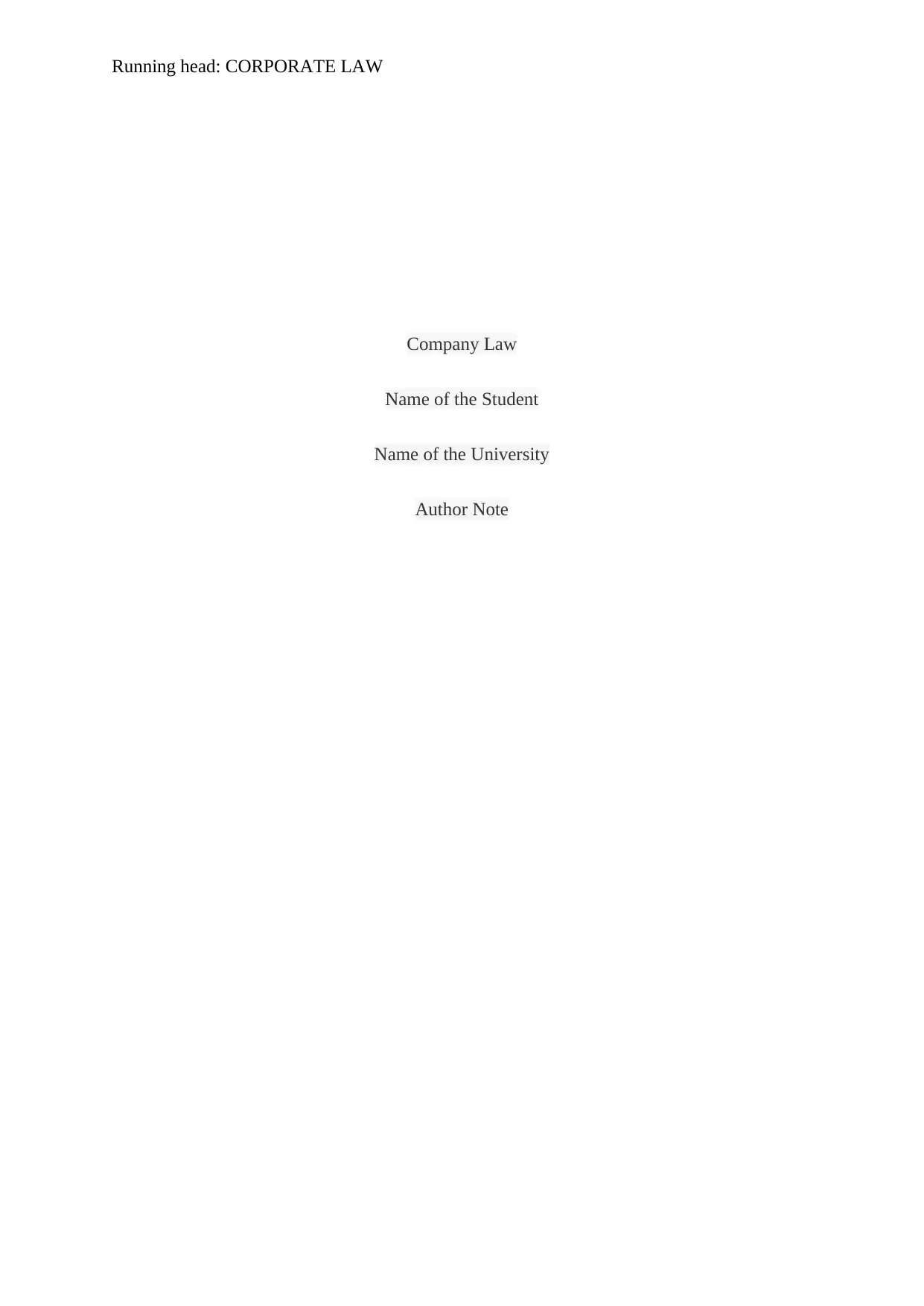
Running head: CORPORATE LAW
Company Law
Name of the Student
Name of the University
Author Note
Company Law
Name of the Student
Name of the University
Author Note
Paraphrase This Document
Need a fresh take? Get an instant paraphrase of this document with our AI Paraphraser
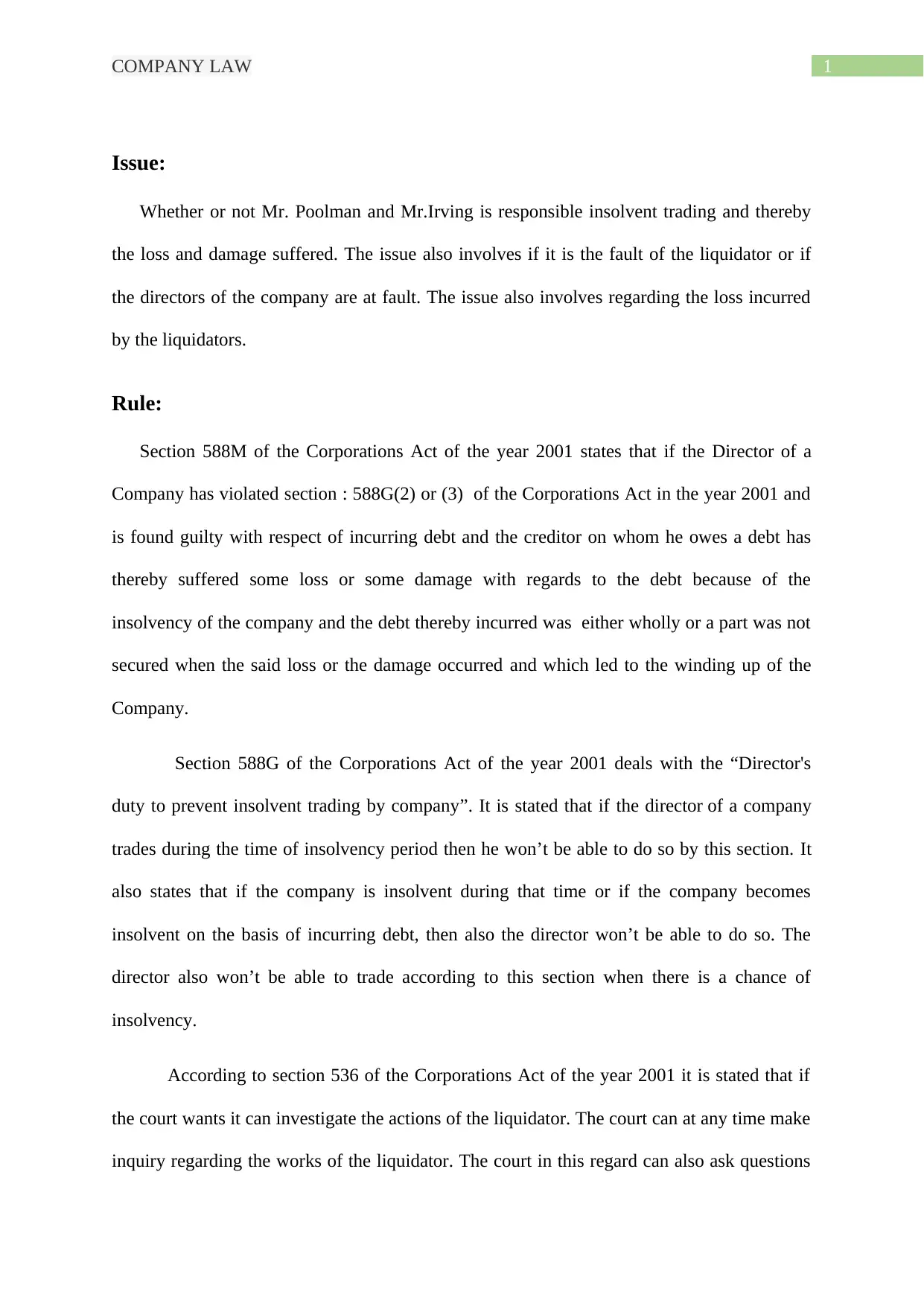
1COMPANY LAW
Issue:
Whether or not Mr. Poolman and Mr.Irving is responsible insolvent trading and thereby
the loss and damage suffered. The issue also involves if it is the fault of the liquidator or if
the directors of the company are at fault. The issue also involves regarding the loss incurred
by the liquidators.
Rule:
Section 588M of the Corporations Act of the year 2001 states that if the Director of a
Company has violated section : 588G(2) or (3) of the Corporations Act in the year 2001 and
is found guilty with respect of incurring debt and the creditor on whom he owes a debt has
thereby suffered some loss or some damage with regards to the debt because of the
insolvency of the company and the debt thereby incurred was either wholly or a part was not
secured when the said loss or the damage occurred and which led to the winding up of the
Company.
Section 588G of the Corporations Act of the year 2001 deals with the “Director's
duty to prevent insolvent trading by company”. It is stated that if the director of a company
trades during the time of insolvency period then he won’t be able to do so by this section. It
also states that if the company is insolvent during that time or if the company becomes
insolvent on the basis of incurring debt, then also the director won’t be able to do so. The
director also won’t be able to trade according to this section when there is a chance of
insolvency.
According to section 536 of the Corporations Act of the year 2001 it is stated that if
the court wants it can investigate the actions of the liquidator. The court can at any time make
inquiry regarding the works of the liquidator. The court in this regard can also ask questions
Issue:
Whether or not Mr. Poolman and Mr.Irving is responsible insolvent trading and thereby
the loss and damage suffered. The issue also involves if it is the fault of the liquidator or if
the directors of the company are at fault. The issue also involves regarding the loss incurred
by the liquidators.
Rule:
Section 588M of the Corporations Act of the year 2001 states that if the Director of a
Company has violated section : 588G(2) or (3) of the Corporations Act in the year 2001 and
is found guilty with respect of incurring debt and the creditor on whom he owes a debt has
thereby suffered some loss or some damage with regards to the debt because of the
insolvency of the company and the debt thereby incurred was either wholly or a part was not
secured when the said loss or the damage occurred and which led to the winding up of the
Company.
Section 588G of the Corporations Act of the year 2001 deals with the “Director's
duty to prevent insolvent trading by company”. It is stated that if the director of a company
trades during the time of insolvency period then he won’t be able to do so by this section. It
also states that if the company is insolvent during that time or if the company becomes
insolvent on the basis of incurring debt, then also the director won’t be able to do so. The
director also won’t be able to trade according to this section when there is a chance of
insolvency.
According to section 536 of the Corporations Act of the year 2001 it is stated that if
the court wants it can investigate the actions of the liquidator. The court can at any time make
inquiry regarding the works of the liquidator. The court in this regard can also ask questions
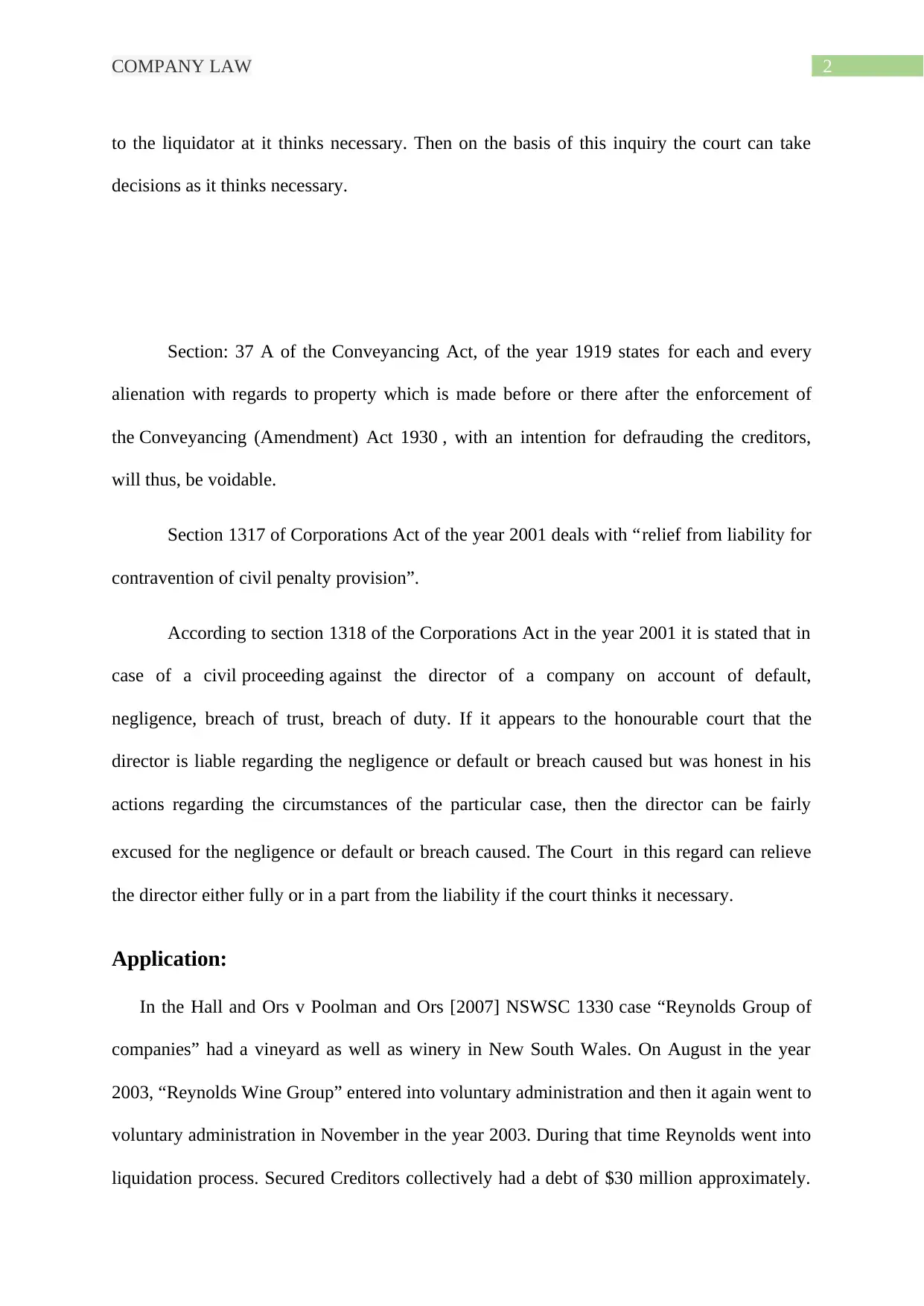
2COMPANY LAW
to the liquidator at it thinks necessary. Then on the basis of this inquiry the court can take
decisions as it thinks necessary.
Section: 37 A of the Conveyancing Act, of the year 1919 states for each and every
alienation with regards to property which is made before or there after the enforcement of
the Conveyancing (Amendment) Act 1930 , with an intention for defrauding the creditors,
will thus, be voidable.
Section 1317 of Corporations Act of the year 2001 deals with “relief from liability for
contravention of civil penalty provision”.
According to section 1318 of the Corporations Act in the year 2001 it is stated that in
case of a civil proceeding against the director of a company on account of default,
negligence, breach of trust, breach of duty. If it appears to the honourable court that the
director is liable regarding the negligence or default or breach caused but was honest in his
actions regarding the circumstances of the particular case, then the director can be fairly
excused for the negligence or default or breach caused. The Court in this regard can relieve
the director either fully or in a part from the liability if the court thinks it necessary.
Application:
In the Hall and Ors v Poolman and Ors [2007] NSWSC 1330 case “Reynolds Group of
companies” had a vineyard as well as winery in New South Wales. On August in the year
2003, “Reynolds Wine Group” entered into voluntary administration and then it again went to
voluntary administration in November in the year 2003. During that time Reynolds went into
liquidation process. Secured Creditors collectively had a debt of $30 million approximately.
to the liquidator at it thinks necessary. Then on the basis of this inquiry the court can take
decisions as it thinks necessary.
Section: 37 A of the Conveyancing Act, of the year 1919 states for each and every
alienation with regards to property which is made before or there after the enforcement of
the Conveyancing (Amendment) Act 1930 , with an intention for defrauding the creditors,
will thus, be voidable.
Section 1317 of Corporations Act of the year 2001 deals with “relief from liability for
contravention of civil penalty provision”.
According to section 1318 of the Corporations Act in the year 2001 it is stated that in
case of a civil proceeding against the director of a company on account of default,
negligence, breach of trust, breach of duty. If it appears to the honourable court that the
director is liable regarding the negligence or default or breach caused but was honest in his
actions regarding the circumstances of the particular case, then the director can be fairly
excused for the negligence or default or breach caused. The Court in this regard can relieve
the director either fully or in a part from the liability if the court thinks it necessary.
Application:
In the Hall and Ors v Poolman and Ors [2007] NSWSC 1330 case “Reynolds Group of
companies” had a vineyard as well as winery in New South Wales. On August in the year
2003, “Reynolds Wine Group” entered into voluntary administration and then it again went to
voluntary administration in November in the year 2003. During that time Reynolds went into
liquidation process. Secured Creditors collectively had a debt of $30 million approximately.
⊘ This is a preview!⊘
Do you want full access?
Subscribe today to unlock all pages.

Trusted by 1+ million students worldwide
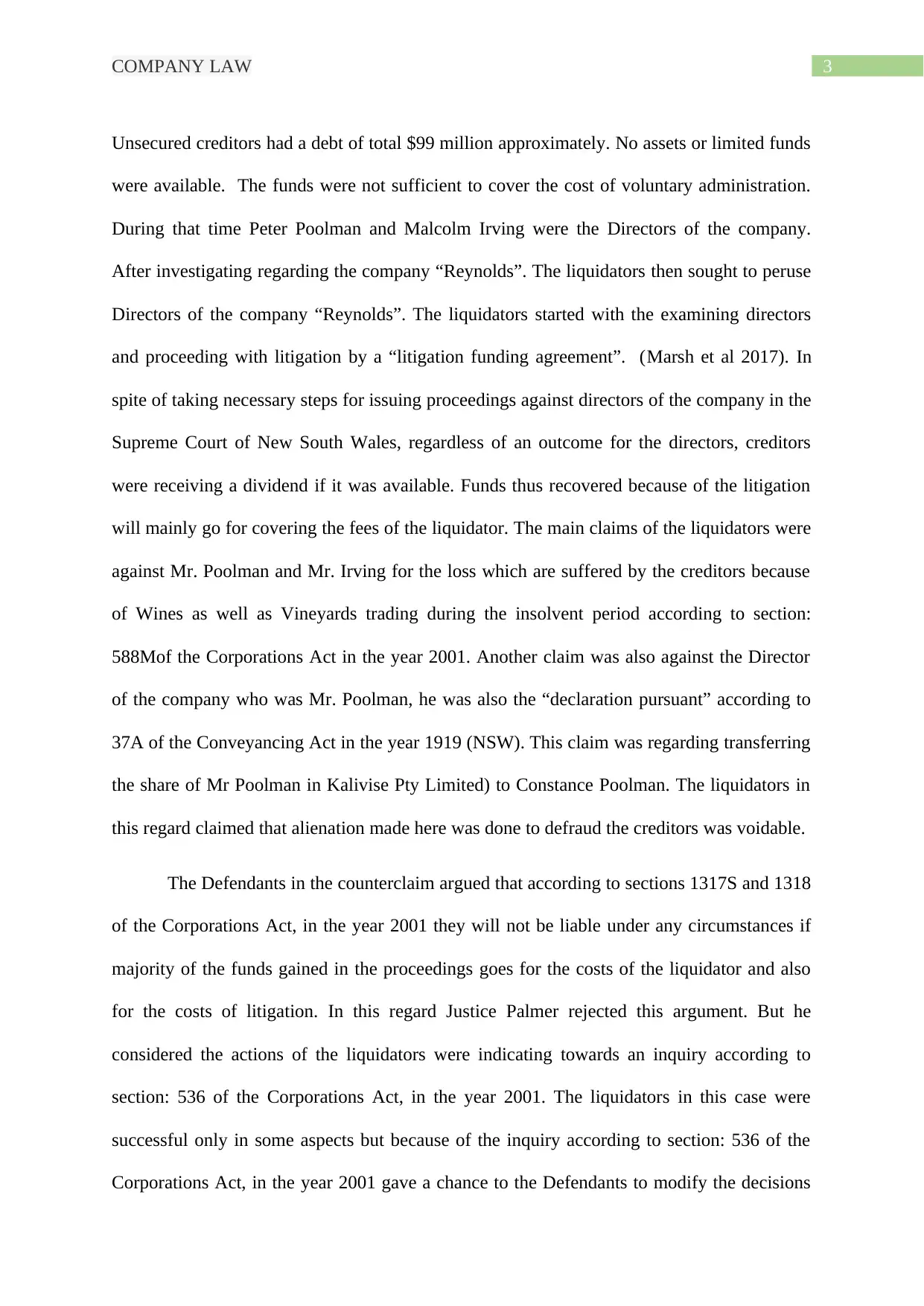
3COMPANY LAW
Unsecured creditors had a debt of total $99 million approximately. No assets or limited funds
were available. The funds were not sufficient to cover the cost of voluntary administration.
During that time Peter Poolman and Malcolm Irving were the Directors of the company.
After investigating regarding the company “Reynolds”. The liquidators then sought to peruse
Directors of the company “Reynolds”. The liquidators started with the examining directors
and proceeding with litigation by a “litigation funding agreement”. (Marsh et al 2017). In
spite of taking necessary steps for issuing proceedings against directors of the company in the
Supreme Court of New South Wales, regardless of an outcome for the directors, creditors
were receiving a dividend if it was available. Funds thus recovered because of the litigation
will mainly go for covering the fees of the liquidator. The main claims of the liquidators were
against Mr. Poolman and Mr. Irving for the loss which are suffered by the creditors because
of Wines as well as Vineyards trading during the insolvent period according to section:
588Mof the Corporations Act in the year 2001. Another claim was also against the Director
of the company who was Mr. Poolman, he was also the “declaration pursuant” according to
37A of the Conveyancing Act in the year 1919 (NSW). This claim was regarding transferring
the share of Mr Poolman in Kalivise Pty Limited) to Constance Poolman. The liquidators in
this regard claimed that alienation made here was done to defraud the creditors was voidable.
The Defendants in the counterclaim argued that according to sections 1317S and 1318
of the Corporations Act, in the year 2001 they will not be liable under any circumstances if
majority of the funds gained in the proceedings goes for the costs of the liquidator and also
for the costs of litigation. In this regard Justice Palmer rejected this argument. But he
considered the actions of the liquidators were indicating towards an inquiry according to
section: 536 of the Corporations Act, in the year 2001. The liquidators in this case were
successful only in some aspects but because of the inquiry according to section: 536 of the
Corporations Act, in the year 2001 gave a chance to the Defendants to modify the decisions
Unsecured creditors had a debt of total $99 million approximately. No assets or limited funds
were available. The funds were not sufficient to cover the cost of voluntary administration.
During that time Peter Poolman and Malcolm Irving were the Directors of the company.
After investigating regarding the company “Reynolds”. The liquidators then sought to peruse
Directors of the company “Reynolds”. The liquidators started with the examining directors
and proceeding with litigation by a “litigation funding agreement”. (Marsh et al 2017). In
spite of taking necessary steps for issuing proceedings against directors of the company in the
Supreme Court of New South Wales, regardless of an outcome for the directors, creditors
were receiving a dividend if it was available. Funds thus recovered because of the litigation
will mainly go for covering the fees of the liquidator. The main claims of the liquidators were
against Mr. Poolman and Mr. Irving for the loss which are suffered by the creditors because
of Wines as well as Vineyards trading during the insolvent period according to section:
588Mof the Corporations Act in the year 2001. Another claim was also against the Director
of the company who was Mr. Poolman, he was also the “declaration pursuant” according to
37A of the Conveyancing Act in the year 1919 (NSW). This claim was regarding transferring
the share of Mr Poolman in Kalivise Pty Limited) to Constance Poolman. The liquidators in
this regard claimed that alienation made here was done to defraud the creditors was voidable.
The Defendants in the counterclaim argued that according to sections 1317S and 1318
of the Corporations Act, in the year 2001 they will not be liable under any circumstances if
majority of the funds gained in the proceedings goes for the costs of the liquidator and also
for the costs of litigation. In this regard Justice Palmer rejected this argument. But he
considered the actions of the liquidators were indicating towards an inquiry according to
section: 536 of the Corporations Act, in the year 2001. The liquidators in this case were
successful only in some aspects but because of the inquiry according to section: 536 of the
Corporations Act, in the year 2001 gave a chance to the Defendants to modify the decisions
Paraphrase This Document
Need a fresh take? Get an instant paraphrase of this document with our AI Paraphraser
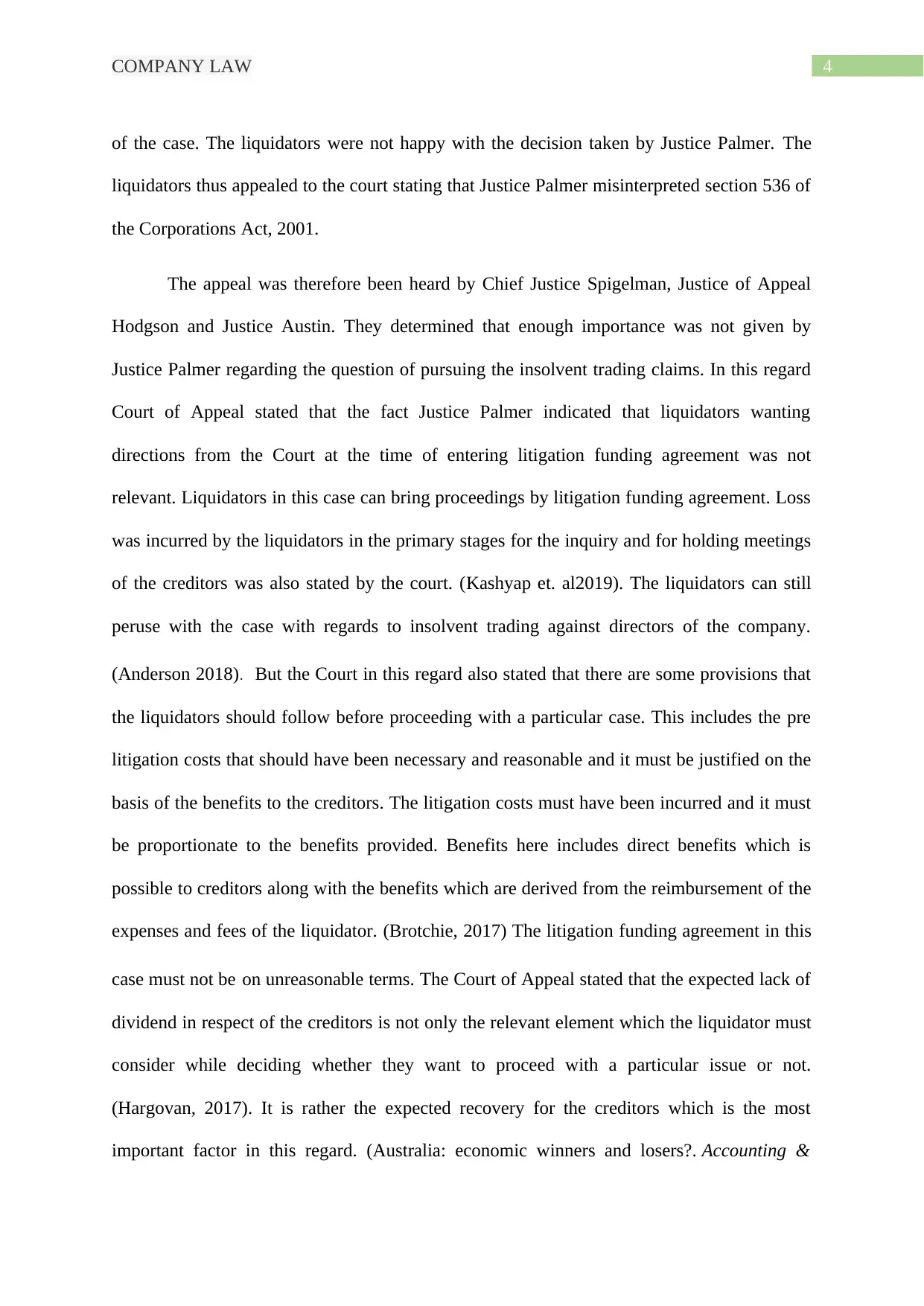
4COMPANY LAW
of the case. The liquidators were not happy with the decision taken by Justice Palmer. The
liquidators thus appealed to the court stating that Justice Palmer misinterpreted section 536 of
the Corporations Act, 2001.
The appeal was therefore been heard by Chief Justice Spigelman, Justice of Appeal
Hodgson and Justice Austin. They determined that enough importance was not given by
Justice Palmer regarding the question of pursuing the insolvent trading claims. In this regard
Court of Appeal stated that the fact Justice Palmer indicated that liquidators wanting
directions from the Court at the time of entering litigation funding agreement was not
relevant. Liquidators in this case can bring proceedings by litigation funding agreement. Loss
was incurred by the liquidators in the primary stages for the inquiry and for holding meetings
of the creditors was also stated by the court. (Kashyap et. al2019). The liquidators can still
peruse with the case with regards to insolvent trading against directors of the company.
(Anderson 2018). But the Court in this regard also stated that there are some provisions that
the liquidators should follow before proceeding with a particular case. This includes the pre
litigation costs that should have been necessary and reasonable and it must be justified on the
basis of the benefits to the creditors. The litigation costs must have been incurred and it must
be proportionate to the benefits provided. Benefits here includes direct benefits which is
possible to creditors along with the benefits which are derived from the reimbursement of the
expenses and fees of the liquidator. (Brotchie, 2017) The litigation funding agreement in this
case must not be on unreasonable terms. The Court of Appeal stated that the expected lack of
dividend in respect of the creditors is not only the relevant element which the liquidator must
consider while deciding whether they want to proceed with a particular issue or not.
(Hargovan, 2017). It is rather the expected recovery for the creditors which is the most
important factor in this regard. (Australia: economic winners and losers?. Accounting &
of the case. The liquidators were not happy with the decision taken by Justice Palmer. The
liquidators thus appealed to the court stating that Justice Palmer misinterpreted section 536 of
the Corporations Act, 2001.
The appeal was therefore been heard by Chief Justice Spigelman, Justice of Appeal
Hodgson and Justice Austin. They determined that enough importance was not given by
Justice Palmer regarding the question of pursuing the insolvent trading claims. In this regard
Court of Appeal stated that the fact Justice Palmer indicated that liquidators wanting
directions from the Court at the time of entering litigation funding agreement was not
relevant. Liquidators in this case can bring proceedings by litigation funding agreement. Loss
was incurred by the liquidators in the primary stages for the inquiry and for holding meetings
of the creditors was also stated by the court. (Kashyap et. al2019). The liquidators can still
peruse with the case with regards to insolvent trading against directors of the company.
(Anderson 2018). But the Court in this regard also stated that there are some provisions that
the liquidators should follow before proceeding with a particular case. This includes the pre
litigation costs that should have been necessary and reasonable and it must be justified on the
basis of the benefits to the creditors. The litigation costs must have been incurred and it must
be proportionate to the benefits provided. Benefits here includes direct benefits which is
possible to creditors along with the benefits which are derived from the reimbursement of the
expenses and fees of the liquidator. (Brotchie, 2017) The litigation funding agreement in this
case must not be on unreasonable terms. The Court of Appeal stated that the expected lack of
dividend in respect of the creditors is not only the relevant element which the liquidator must
consider while deciding whether they want to proceed with a particular issue or not.
(Hargovan, 2017). It is rather the expected recovery for the creditors which is the most
important factor in this regard. (Australia: economic winners and losers?. Accounting &
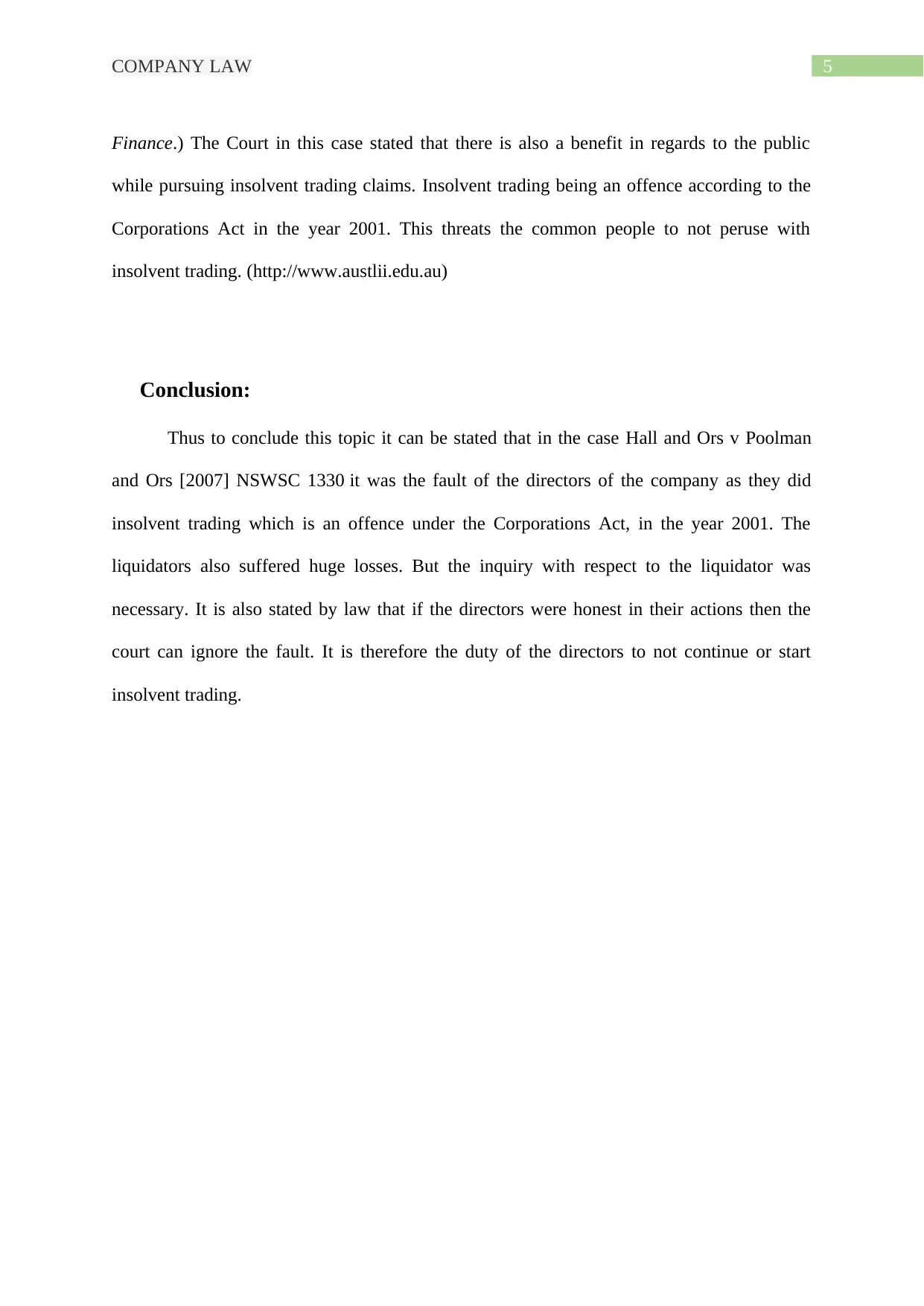
5COMPANY LAW
Finance.) The Court in this case stated that there is also a benefit in regards to the public
while pursuing insolvent trading claims. Insolvent trading being an offence according to the
Corporations Act in the year 2001. This threats the common people to not peruse with
insolvent trading. (http://www.austlii.edu.au)
Conclusion:
Thus to conclude this topic it can be stated that in the case Hall and Ors v Poolman
and Ors [2007] NSWSC 1330 it was the fault of the directors of the company as they did
insolvent trading which is an offence under the Corporations Act, in the year 2001. The
liquidators also suffered huge losses. But the inquiry with respect to the liquidator was
necessary. It is also stated by law that if the directors were honest in their actions then the
court can ignore the fault. It is therefore the duty of the directors to not continue or start
insolvent trading.
Finance.) The Court in this case stated that there is also a benefit in regards to the public
while pursuing insolvent trading claims. Insolvent trading being an offence according to the
Corporations Act in the year 2001. This threats the common people to not peruse with
insolvent trading. (http://www.austlii.edu.au)
Conclusion:
Thus to conclude this topic it can be stated that in the case Hall and Ors v Poolman
and Ors [2007] NSWSC 1330 it was the fault of the directors of the company as they did
insolvent trading which is an offence under the Corporations Act, in the year 2001. The
liquidators also suffered huge losses. But the inquiry with respect to the liquidator was
necessary. It is also stated by law that if the directors were honest in their actions then the
court can ignore the fault. It is therefore the duty of the directors to not continue or start
insolvent trading.
⊘ This is a preview!⊘
Do you want full access?
Subscribe today to unlock all pages.

Trusted by 1+ million students worldwide
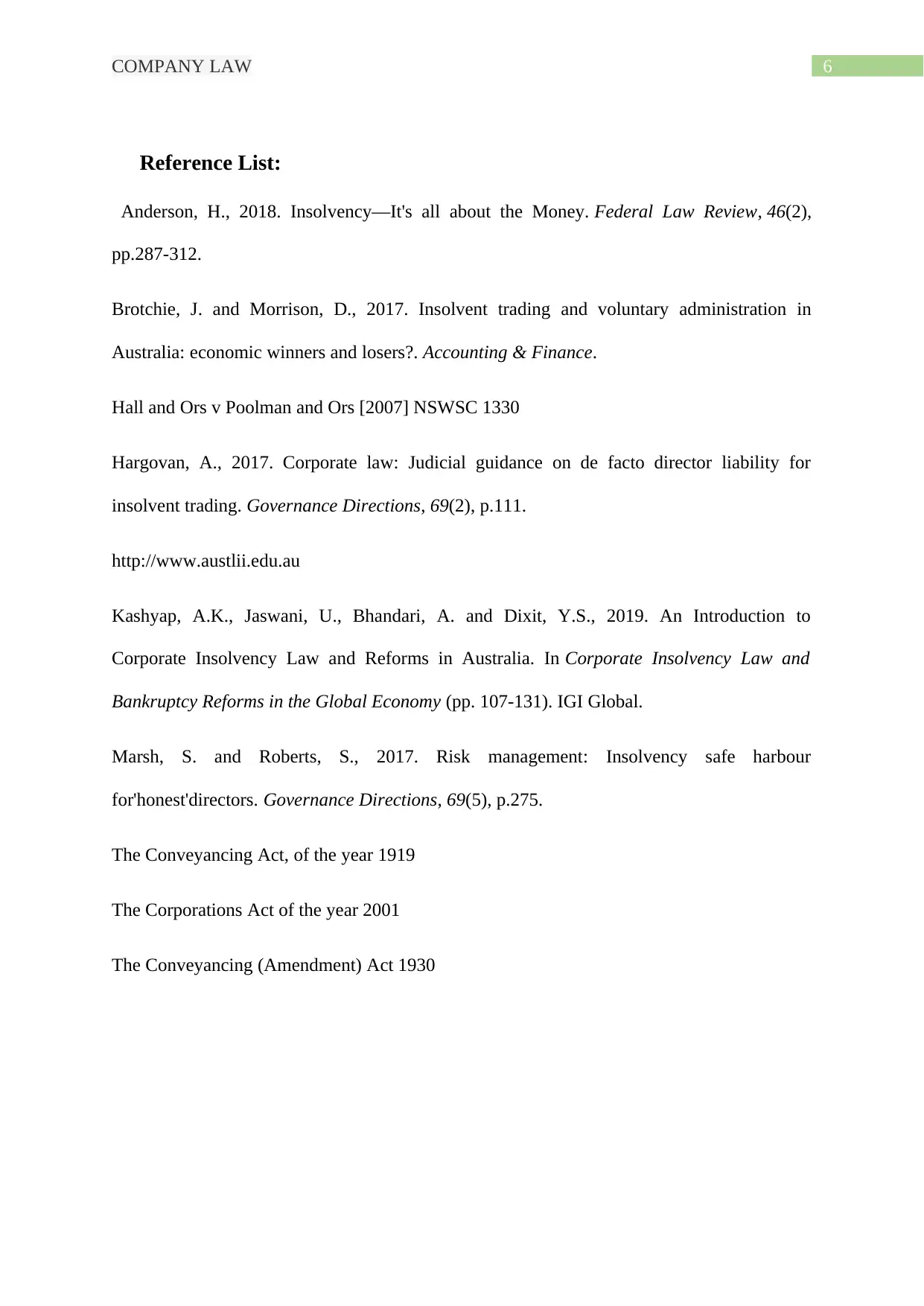
6COMPANY LAW
Reference List:
Anderson, H., 2018. Insolvency—It's all about the Money. Federal Law Review, 46(2),
pp.287-312.
Brotchie, J. and Morrison, D., 2017. Insolvent trading and voluntary administration in
Australia: economic winners and losers?. Accounting & Finance.
Hall and Ors v Poolman and Ors [2007] NSWSC 1330
Hargovan, A., 2017. Corporate law: Judicial guidance on de facto director liability for
insolvent trading. Governance Directions, 69(2), p.111.
http://www.austlii.edu.au
Kashyap, A.K., Jaswani, U., Bhandari, A. and Dixit, Y.S., 2019. An Introduction to
Corporate Insolvency Law and Reforms in Australia. In Corporate Insolvency Law and
Bankruptcy Reforms in the Global Economy (pp. 107-131). IGI Global.
Marsh, S. and Roberts, S., 2017. Risk management: Insolvency safe harbour
for'honest'directors. Governance Directions, 69(5), p.275.
The Conveyancing Act, of the year 1919
The Corporations Act of the year 2001
The Conveyancing (Amendment) Act 1930
Reference List:
Anderson, H., 2018. Insolvency—It's all about the Money. Federal Law Review, 46(2),
pp.287-312.
Brotchie, J. and Morrison, D., 2017. Insolvent trading and voluntary administration in
Australia: economic winners and losers?. Accounting & Finance.
Hall and Ors v Poolman and Ors [2007] NSWSC 1330
Hargovan, A., 2017. Corporate law: Judicial guidance on de facto director liability for
insolvent trading. Governance Directions, 69(2), p.111.
http://www.austlii.edu.au
Kashyap, A.K., Jaswani, U., Bhandari, A. and Dixit, Y.S., 2019. An Introduction to
Corporate Insolvency Law and Reforms in Australia. In Corporate Insolvency Law and
Bankruptcy Reforms in the Global Economy (pp. 107-131). IGI Global.
Marsh, S. and Roberts, S., 2017. Risk management: Insolvency safe harbour
for'honest'directors. Governance Directions, 69(5), p.275.
The Conveyancing Act, of the year 1919
The Corporations Act of the year 2001
The Conveyancing (Amendment) Act 1930
1 out of 7
Related Documents
Your All-in-One AI-Powered Toolkit for Academic Success.
+13062052269
info@desklib.com
Available 24*7 on WhatsApp / Email
![[object Object]](/_next/static/media/star-bottom.7253800d.svg)
Unlock your academic potential
Copyright © 2020–2026 A2Z Services. All Rights Reserved. Developed and managed by ZUCOL.





